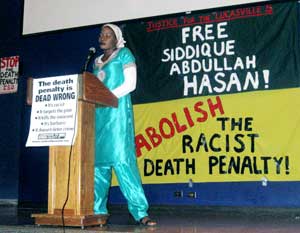
Follow workers.org on



RED HOT: TRAYVON MARTIN
CHINA,
AFGHANISTAN, FIGHTING RACISM, OCCUPY WALL STREET,
PEOPLE'S POWER, SAVE OUR POST OFFICES, WOMEN, AFRICA,
LIBYA, WISCONSIN WORKERS FIGHT BACK, SUPPORT STATE & LOCAL WORKERS,
EGYPT, NORTH AFRICA & MIDDLE EAST,
STOP FBI REPRESSION, RESIST ARIZONA RACISM, NO TO FRACKING, DEFEND PUBLIC EDUCATION, ANTI-WAR,
HEALTH CARE,
CUBA, CLIMATE CHANGE,
JOBS JOBS JOBS,
STOP FORECLOSURES, IRAN,
IRAQ, CAPITALIST CRISIS,
IMMIGRANTS, LGBT, POLITICAL PRISONERS,
KOREA,
HONDURAS, HAITI,
SOCIALISM,
GAZA



|
|
Forum reveals a 'broken system'
By
Sharon Danann
Toledo, Ohio
Published Nov 1, 2007 11:00 PM
On Oct. 21, a crowd filled an auditorium at the University of Toledo to hear
the voices of those who have been wronged by the criminal justice system,
directly by spending many years in prison for crimes they did not commit, or
indirectly by having their loved ones locked away from them under the same
false pretenses.
|
Saadiqah Amatullah Hasan speaking at
Toledo rally Oct. 21.
WW photo: Susan Schnur
|
Several of the speakers are on a national speaking tour for the Campaign to End
the Death Penalty: Yusef Salaam, who spent seven years in prison for the widely
publicized Central Park jogger case before being exonerated; Saadiqah Amatullah
Hasan, director of the campaign to free her spouse, Siddique Abdullah Hasan,
one of the Lucasville 5 on Ohio’s death row; and Harold Wilson, who spent
16 years on Pennsylvania’s death row before his exoneration.
In opening remarks, Washington Muhammad from the Nation of Islam pointed out
that “Blacks in this country have always been under the death penalty.
Private prisons reap millions off of the Black men who are in them. Violence
has been made into a commodity.”
In April 1989, a then 15-year-old Yusef Salaam was arrested in New York’s
Central Park for other activities, but the pressure was on to find a suspect in
the “Central Park jogger” case. Salaam was convicted of rape and
assault and served five years in prison. In the years since his release, he has
faced continuing harassment. For instance, last January he received an eviction
notice.
The real perpetrator was the “Eastside rapist” who came forth with
the information about the Central Park case. There was a virtual media whiteout
because to publicize the real perpetrator would be to show prosecutorial
misconduct.
Jackie Thomas spoke on behalf of Rasheem Matthew, who was falsely convicted of
murdering a fellow prisoner during the Lucasville rebellion by “jailhouse
snitches” who walked away after the trial because their sentences were
cut as a reward for their testimony. Matthew did not receive a death sentence
but is in the most restrictive solitary confinement in Ohio’s
“supermax” prison, as are the rest of the prisoners connected to
the Lucasville rebellion.
Kandy Cannon told the story of another Lucasville prisoner, one who did not
participate in the rebellion. He was just a few weeks from parole and he had
been moved to a different part of the prison. However, he was a “known
associate” of Keith LaMar (Bomani Shakur), one of the Lucasville 5, and
the prosecutors wanted him to testify against LaMar.
He heroically refused to testify falsely against his friend. True to their
threats, he was charged with aggravated murder. Cannon ended her account with,
“This man is innocent. This man is Black, and this man is my husband of
22 years.” She had just given a moving rendition of the story of Derek
Cannon, another one of the Lucasville prisoners now housed in the
“supermax.”
Conditions like Abu Ghraib
Harold Wilson spent 16 years on Pennsylvania’s death row. He was charged
with three counts of first degree murder because “he was the only one
large enough to do it.” Wilson pointed out the inherent race
discrimination in “death-qualified” jury selection due to the fact
that more Black people are likely to admit that they could not vote to sentence
someone to the death penalty. At his trial, witnesses lied and the judge would
not allow his attorney to object.
Once on death row, he worked with Mumia Abu-Jamal and the 220 other prisoners
for change. They forged unity as the Capital Case Defendants Association. They
filed lawsuits for fresh air and better conditions, and they were persecuted
for it. They went on hunger strikes together. The Greene State Correctional
Institution was a training ground for Abu Ghraib in Iraq with vicious racist
guards.
In Wilson’s case, he was able to get a tape of the prosecutor training
other prosecutors in jury selection using race. With that evidence, he was able
to get a new trial which ended in a mistrial. Then by fighting to get the state
to turn over the results of DNA analysis, he was acquitted in 2005. However,
Wilson still can’t get housing, medical benefits or compensation. He
concentrates his efforts on helping to build awareness of how the system works
against people of color and the poor.
Saadiqah Amatullah Hasan reviewed the lack of concrete, reliable evidence in
the trial of her spouse, Siddique Abdullah Hasan, especially considering the
fact that he was charged with a capital crime, the killing of a prison guard
related to the Lucasville rebellion. There were no murder weapons, no
confession, only testimony from “jailhouse snitches” not
substantiated by any other testimony.
Hasan told the crowd, “You are obligated to be a part of this
revolutionary movement. You are obligated to be a part of fighting the
oppressor.”
Articles copyright 1995-2012 Workers World.
Verbatim copying and distribution of this entire article is permitted in any medium without royalty provided this notice is preserved.
Workers World, 55 W. 17 St., NY, NY 10011
Email: [email protected]
Subscribe [email protected]
Support independent news DONATE
|
|


